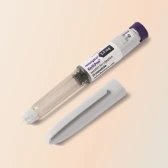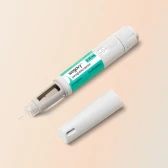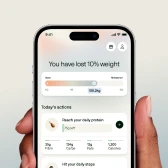Eligibility depends on the medication, how you access it, and your personal health profile. Here’s how the NHS and private clinics assess BMI requirements for weight loss medications—and how Voy considers treatment from a BMI of 27 after a thorough clinical review and safety screening.
Key Takeaways
- Licences generally state BMI ≥30, or ≥27 with a weight‑related condition.
- NHS access is narrower. Thresholds are often higher and usually run through specialist weight‑management services.
- Private providers: criteria vary, but most follow the licence; some consider ethnicity and broader risk factors.
- Voy may consider treatment from BMI 27 after a full clinical review. Starting at BMI 27 without a listed condition is off‑label.

The short answer to “What BMI do I need?”
There isn’t a single UK-wide number. UK licences for Wegovy (semaglutide) and Mounjaro (tirzepatide) set treatment at BMI 30 or above, or BMI 27 or above with a weight‑related condition such as high blood pressure, high cholesterol or type 2 diabetes.
NHS access is narrower. Thresholds are often higher and vary by local funding. Many areas prioritise BMI 35 and above, and treatment is usually through specialist weight-management services with defined criteria and long waiting lists.
Private providers can take a more individual view and may consider ethnicity and broader risk factors.
If your BMI is 27 or above, you may qualify for treatment after full clinical review. Complete a short clinical assessment and, if treatment is appropriate, we’ll build a personalised plan with careful monitoring and maintenance to help you keep results.
NHS vs private vs Voy (at a glance)
- NHS: Access is typically through specialist weight- management services, with higher BMI thresholds, limited medicine choice, and long waiting lists.
- Private providers: Often BMI 30 and above, or 27 and above with a weight-related condition. Some adjust for ethnicity and broader risk factors.
- Voy: May consider treatment from BMI 27 after a full clinical review. Starting at BMI 27 without a listed weight-related condition is off-label. We explain how this is assessed and kept safe below.
Voy eligibility: start from BMI 27
If your BMI is 27 or above and you pass a full clinical assessment, you can start your journey safely with Voy.
Why BMI 27
Evidence shows that health risks start to rise well before a BMI of 30.
- Higher BMI raises the risk of type 2 diabetes, hypertension, heart failure, asthma, COPD, and several cancers.
- The Framingham Heart Study found that a BMI of 25 or above accounted for roughly a quarter of high blood pressure cases and contributed to coronary heart disease in long‑term follow‑up.
- Modern GLP-1 therapies can help people lose up to 22.5% of body weight and reduce waist circumference. These changes are associated with improvements in insulin sensitivity, blood pressure and lipids when combined with lifestyle support.
- Losing even 5–10% of body weight improves blood sugar, blood pressure and cholesterol. In the Diabetes Prevention Program, structured lifestyle change cut the chance of developing type 2 diabetes by about 58%.
By prescribing GLP-1s for people with a BMI over 27, Voy aims to intervene sooner, prevent progression to obesity, and help more people live longer, healthier lives.
Safety first: how we keep this responsible
We maintain the highest safety and verification standards including:
- Live photo verification: All patients with BMI under 30 must complete a real-time in-app photo to verify identity and BMI.
- Regular monitoring: Weight updates every 6 months and a new photo at least once a year to maintain safe treatment.
- Guided titration: Doses adjusted gradually with ongoing clinical review, based on your response and side effects.
- Side-effect support: Fast access to clinicians via live chat or the hotline for tailored advice and, where appropriate, short-term symptom relief if needed (for example, anti-nausea tablets).
- Safety at lower BMI: We stop treatment if BMI falls below safe thresholds.
Side effects support at Voy
"If you're using Voy and you experience any side effects, rest assured that our expert clinicians are just a message or phone call away. They can adjust your dose, prescribe medication to ease your symptoms, or simply offer reassurance.
Everyone responds differently to weight loss treatment and we'll help you find what feels right for you."

Off-label prescribing explained
Off-label means using a licensed medicine in a way that differs from the terms of its licence. It is common and legal in the UK, including within the NHS, when supported by evidence and careful clinical judgement.
For GLP-1 treatment, starting at BMI 27 to 29.9 without a weight-related condition is off-label. At Voy, a qualified clinician assesses your medical history, current medicines and overall risk to confirm that potential benefits outweigh risks before prescribing.
If you want a bit more detail, see our short guide to off-label prescribing.
Why BMI matters for GLP-1 eligibility
BMI helps us understand whether GLP-1 treatment could benefit you. It is a quick screening tool of weight-related health risk, but only one part of your assessment. We also consider your medical history, current medications, reproductive plans, mental health history and any past response to treatment.
To verify BMI, we combine your stated height and weight with an in-app full-length photo. You can see how this works in our prescription process.
You then update weight and BMI at least every 6 months so we can keep treatment safe, track progress, and adjust dosing if needed.
What you get with Voy
- Clinician-led plan with dosing matched to goals and tolerance
- Side-effect support with rapid access to clinicians
- In-app tools for weight, appetite, and habit tracking
- Coaching on nutrition, movement, sleep, and relapse prevention
- Switching support if moving from another provider or changing medications
- Maintenance option to help keep results, with ongoing treatment if appropriate











